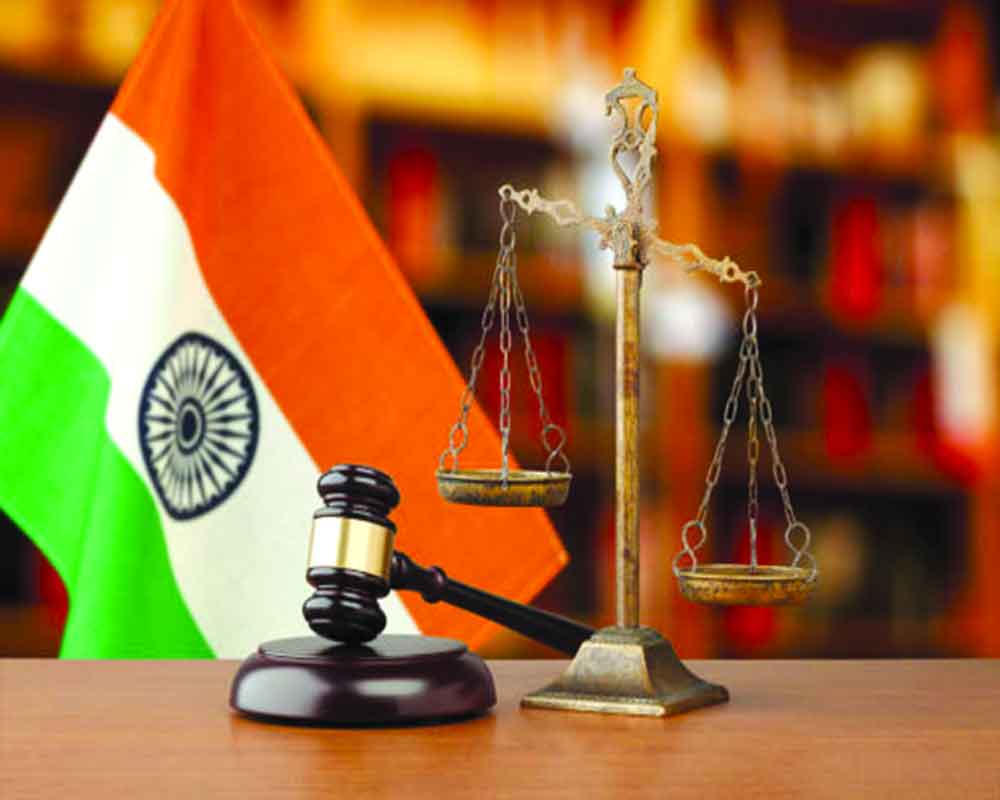The PM’s emphasis on the use of local language will indeed increase the confidence of the masses in the justice delivery system and they will feel connected with it
At the CMs-CJs’ (Chief Ministers-Chief Justices) conference in Delhi on April 30, Prime Minister Narendra Modi and Chief Justice of India NV Ramana too were present. There was a free and frank discussion on why cases in most of the courts are languishing. The Prime Minister said three and a half lakh undertrials are languishing in prisons and expediting their trials is essential to deliver justice as soon as possible. Most of these undertrials are poor and deserve early justice. The Prime Minister advised the use of the local language up to the district-level courts to dispense justice.
Chief Justice Ramana opined that one of the causes of piling up of the cases is the non-performance of the legislature and the executive, itself a contentious issue. Perhaps, the CJI’s contention is that laws passed are not clearly drafted and that leads to unnecessary controversy. “I think the time has come now to revisit the demand and take it to a logical conclusion. The practice of law before Constitutional courts should be based on one's intelligence and understanding of law…,†the Chief Justice of India said.
Similarly, indifferent administration at the lower level compels citizens to approach courts to seek justice. The judiciary’s perpetual grouse is that despite vacancies, judges are not appointed on time. There are a number of points that trouble all the three wings of Government.
Seventy per cent of the cases arise from the administrative side or the government. The first step should be to restrain the functionaries from giving adverse decisions. Doubts should be cleared by the department lawyers and the courts must not make the citizens spend time and money on litigation unless absolutely necessary.
According to the Prime Minister, the Centre has repealed 1,450 laws because they had become obsolete, and another 350 laws are lined up to be struck off. The States should also pursue this line of spring cleaning. Moreover, the drafting of petitions, affidavits as well judgments in district courts and High Courts is tortuous when it comes to terminology. An institution under my charge a few years ago received a judgment that began with Rabindra Nath Tagore and went on in that poetic tone; it was a pleasure to read it. But we had to appeal to the apex court, which turned down the poetic piece. All this means a consumption of time, money and the need for more solicitors, advocates and judges.
Way back in 1976, we had to take legal opinions on a company based in the UK. The London lawyer produced a draft the next day that was just a little longer than one page. The one that came from India was ten times longer; the difference was in the style of writing. The advocate in the UK preferred the shorter one and rightly so because the points covered were about the same. The other area of editing is appeals. I am not a lawyer, yet I have come across a case of tenant eviction which began in Mumbai’s Small Causes Court and ended up in the Supreme Court! The right to appeal should be reduced to two. Before commencing the final hearing, the judge should decide how much maximum time the two opposing advocates would be permitted. If either advocate exceeds his limit, s/he should have to pay a stipulated sum of money every extra minute, as is done on taxi rides for every hundred metres exceeding the minimum fare.
Very recently, I heard of an advocate arguing in the apex court for two full working days. Adjournments should cost expensively to the requesting side; say, half the court fee charged to the litigant. Otherwise, adjournments would continue to be availed freely and popular advocates would carry on getting more and more briefs. Whereas if the client has to pay an adjournment fee, s/he would choose an advocate who has served in Delhi as well as in other cities.
Judicial activism should be kept to the minimum as also public interest litigation (PILs). The latter was introduced to help the poor and the voiceless to articulate their grievances. It was never meant for the rich and influential. How to “plead promptly without failing to communicate with the judge†is one subject that should be taught seriously. In my college days, a great many topics were dealt with. Often, as a result, if an advocate argued speedily, the judges could not always understand the finer lines of the argument. Or the advocate had to go on pleading indefinitely until he felt he had got his point across, or the judge stopped him from going on. Given the current state of our judicial system, this must be consigned to history.
(The writer is a well-known columnist, an author and a former member of the Rajya Sabha. The views expressed are personal.)


























